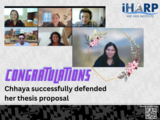Chhaya Kulkarni Successfully Defends Thesis Proposal
Chhaya successfully defended her thesis proposal on Friday, December 16!
Help us celebrate her success and successful defense.
Congratulations Chhaya!!!
Research Title
Spatiotemporal Data Mining using Multi-View Learning on Climate Change Studies
Abstract
Data is generated at a phenomenal rate today from different sources such as sensors, global positioning systems, remote sensing devices, social media, etc. Spatiotemporal data in particular possesses unique characteristics such as spatial autocorrelation, spatiotemporal heterogeneity, temporal non-stationarity, and data residing on multiple scales and resolutions. Moreover, spatiotemporal data can be derived from multiple sources or views. Traditional data mining methods rely on analyzing and forecasting features from a single view alone. However, considering the mutually enriched information from multiple sources can lead to developing a broad understanding surrounding the spatial object which in turn can lead to making accurate spatiotemporal predictions. We address three important aspects in this study: (a) using spatiotemporal data from polar regions, we integrate all the views – spatial and temporal to determine anomalies/discords; (b) create neighborhoods to preserve the spatial correlation and heterogeneity present in the data; and (c) use neighborhood definition to analyze change along with multi view learning.
Detecting anomalous patterns from multiple and dynamic data sources adds to the complexity of making effective conclusions. In this study, we propose to build a novel framework to make spatiotemporal analysis related to the polar regions. First, we generate neighborhoods to tap into spatiotemporal autocorrelation and heterogeneity. Second, we apply a multi-view learning model to take advantage of data coming from multiple related sources and perform multi-domain spatiotemporal analysis. Third, we detect anomalies that would aid in understanding which areas in the polar regions show unusual behavior and also the time intervals when these anomalies are present for a large spatial extent, i.e. Greenland wide. We use two scenarios where we studied the Arctic and Antarctic regions to study variables related to snow melt and sea ice thickness respectively to show a proof of concept of how multi-view learning can help understand the processes at play in understanding anomalous behavior in the cryosphere. Our initial results in both Arctic and the Antarctic regions evaluating anomalous patterns present across regions and seasons corroborate findings of the polar science domain experts. We are interested in specifically understanding the role played by the climate in influencing the cryosphere variables using our proposed framework, incorporating multiple views coming from multiple domains in a given region.
Detecting anomalous patterns from multiple and dynamic data sources adds to the complexity of making effective conclusions. In this study, we propose to build a novel framework to make spatiotemporal analysis related to the polar regions. First, we generate neighborhoods to tap into spatiotemporal autocorrelation and heterogeneity. Second, we apply a multi-view learning model to take advantage of data coming from multiple related sources and perform multi-domain spatiotemporal analysis. Third, we detect anomalies that would aid in understanding which areas in the polar regions show unusual behavior and also the time intervals when these anomalies are present for a large spatial extent, i.e. Greenland wide. We use two scenarios where we studied the Arctic and Antarctic regions to study variables related to snow melt and sea ice thickness respectively to show a proof of concept of how multi-view learning can help understand the processes at play in understanding anomalous behavior in the cryosphere. Our initial results in both Arctic and the Antarctic regions evaluating anomalous patterns present across regions and seasons corroborate findings of the polar science domain experts. We are interested in specifically understanding the role played by the climate in influencing the cryosphere variables using our proposed framework, incorporating multiple views coming from multiple domains in a given region.
Committee Members
Dr. Vandana Janeja, Chair/Advisor, Dr. Bayu Adhi Tama, Dr. Jianwu Wang, Dr. Karuna Joshi, Dr. Nicole Jeanne Schlegel
Tags:
Posted: December 16, 2022, 11:25 AM
